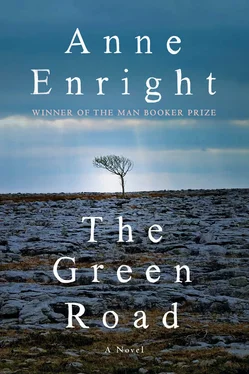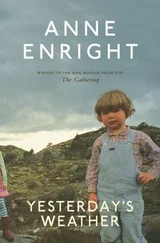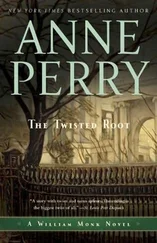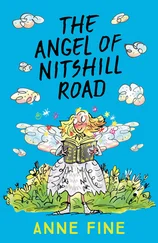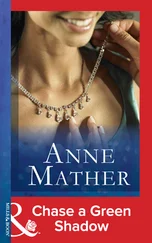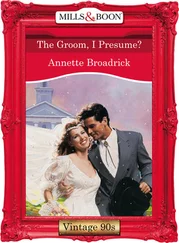And of course it could be sold. That was also true. The house was hers and she could sell it, if she liked.
‘The turkey is great,’ said Rory from the little table and Constance was proud of him; Rory, the peacemaker, working hard.
‘Thank you,’ said Dan.
‘Very moist,’ said Dessie.
Dan tried not to laugh at the word.
‘You think?’
He looked up at stubby Dessie McGrath, there at the top of the table. He remembered a brief encounter with the alcoholic brother, Ferdy McGrath, when they were both still boys, playing by the river Inagh. But he never got near Dessie. Not even close. His brother-in-law was not so much straight as sorted. Dessie McGrath was a weapon.
‘Yes it is,’ said Dan. ‘Surprisingly moist.’
Dessie did not blink.
‘Hard to get right, at a guess,’ he said and went back to his plate, shovelling the stuff into himself, while the Madigan children chewed and chewed, and could not swallow.
The truth was that the house they were sitting in was worth a ridiculous amount, and the people sitting in it were worth very little. Four children on the brink of middle age: the Madigans had no traction in the world, no substance. They had no money. Dan, especially, had no money, and he could could not think why this was, or who might be to blame. But he recognised, in the silence, the power Rosaleen had over her children, none of whom had grown up to match her.
‘I don’t know how I’ll eat all this.’ She was a bit like a child, herself. ‘My goodness.’
She forgot to tell us about money, he thought, and we forgot to make any, because the Madigans were above all that. The stuck-up Madigans, the Madigans beyond the bridge. Rosaleen thought money would fly to us, because we deserved it. She thought we would spend our lives giving it away.
Which is what Emmet had done, pretty much. Poured his life out, like water into the African sands. He felt it keenly — they all did — the lack of anything to show for it all. Twenty years saving a world that remained unsaved. If you thought about it, he was as much a fantasist as his mad mother.
The yellow rose gave up a clump of pale petals and they sighed as they hit the mantelpiece.
Hanna said, ‘You know, Mammy, it’s our house too.’
Rosaleen looked at her. She said, ‘Beautiful. Beautiful Hanna Madigan.’
Each of them came back from the privacy of their own thoughts then, ready for the fight. The air cleared.
‘What do you mean?’ said Hanna.
‘Nothing,’ said Rosaleen. ‘Just that you are. So pretty.’
‘Thank you,’ said Hanna.
‘You have a heart shaped face, I always thought. An old-fashioned face. You were born to play Viola.’
‘Yeah well,’ said Hanna.
‘No?’
‘Sure,’ said Hanna.
‘Well you are an actress,’ Constance said, trying to keep the inverted commas out of her voice.
‘Yes I am an actress,’ said Hanna. ‘Yes that is what I am.’
‘Well then,’ said Rosaleen, in a soothing tone.
‘I just don’t,’ said Hanna. Her hand was flat and she brought the edge of it down on the tabletop. ‘I don’t.’
‘Work?’ said Emmet.
‘Darling, you have a baby to look after,’ said Rosaleen.
‘Hang on,’ said Dan.
‘Jesus Christ!’ said Hanna, losing it.
‘Can you please leave her alone?’ Dan said, but Hanna was already building to a shout.
‘I Just Don’t Want To Play Viola.’
‘I don’t know how you can say that,’ said her mother, sadly.
‘I’m not sure anyone’s asked,’ said Emmet. ‘In all fairness’.
‘I have no interest in playing Viola,’ said Hanna in a very deliberate voice. ‘I am interested in process. That’s what I do. New stuff. Viola is not where I am at, all right? It’s not what I’m for. Anyway, nobody ever puts on Twelfth Night .’
‘What a pity,’ said her mother. ‘I’d love to see you do it. Before I get too old.’
‘Rosaleen, darling,’ said Dan. ‘Please stop.’
‘Stop what?’ said Rosaleen, but by some miracle she distracted herself into an old story about the night war was declared, when she was ten years old and Anew McMaster was playing Othello, naked to the waist and his beautiful voice, you could feel it on your skin, it was a force. Her father saying they were in for it now — because of the war, you know — and she had no idea what he meant. She thought it was something to do with the events on stage.
‘What about your mother?’ Constance said quietly and Rosaleen sighed.
‘Oh, Mama.’
‘Was she there, too?’
‘That’s a good question,’ said Rosaleen.
‘I mean, you know what I mean. What was she like?’
‘Sorry?’
‘Was she nice?’
‘Well of course she was nice.’
‘What kind of nice?’ Hanna joined in, now. ‘What style of a woman was she?’
‘My mother?’ said Rosaleen. ‘Oh she was lovely. She was always beautifully turned out. She had to go to Limerick specially, or up to Dublin once a year, for a fitting. Always wore a hat. She had three of them on the go; a summer hat, a winter felt, and, you know, a thing for the races, or a wedding if there was a wedding. A dress hat, that is what I mean.’
‘Right,’ said Hanna. They were all turned towards their mother now. They were looking for something from her and Rosaleen did not know what it was.
‘She always did things the right way,’ she said.
Dan said, ‘And was she — I don’t know. Was she a happy type?’
‘Well I think she was happy,’ said Rosaleen. ‘What kind of a question is that?’
To which there was no answer, really.
‘It’s a very hard thing,’ said Rosaleen, finally. ‘To describe your mother.’
‘Yes,’ said Hanna.
‘Except that she is your mother,’ Constance said, her voice full of disapproval, her face tucked down as she worked her plate. But the others did not know what she meant by that. And they sat for a moment, in silence.
‘It’s like there’s some secret,’ said Hanna. ‘But there just isn’t.’
And there they were. It was a Christmas like the ones they remembered from the old days — and how could they forget how the dinner always ended? It was traditional, you might say. Rosaleen got upset.
‘I don’t know why everyone is getting at me,’ she said. ‘The ungrateful children I reared.’
Tears coated her eyeballs; she blinked them back.
‘Oh, darling,’ said Dan in a voice that was almost bored. ‘Rise above.’
‘I gave you everything.’
Constance reached a useless hand across the tablecloth.
‘And there is no end to it. I am still handing it over. I can see no end to it all.’
She was on her dignity, face averted.
‘Whatever I did — whatever it was — it was not enough. Clearly. That’s all. I just don’t know.’ The tears spilled over now. Rosaleen was a little girl. Rosaleen was a sad old woman. Their own mother. In a moment she would leave and go up to bed and Oh, they all loved her now, they were hopeless in it. They yearned to make her happy.
‘Stop, Mammy,’ said Constance. ‘You’ll make yourself sick, now.’
‘No I am not talking to you, not any of you,’ she said. ‘Shauna, say your poem.’
‘What poem, Granny?’
‘Oh little Corca Baiscinn.’
But Shauna did not have that poem, or any poem. She had a song, said Constance. But she didn’t have a song either, apparently.
‘Did you bring your tin whistle?’ said Dessie.
‘No,’ said Shauna. Then she changed her mind. ‘I mean yes, I have it here.’
‘Good girl.’
Shauna stood where she was, slender in a dress of black jersey that just about covered the beautiful S of her backside. She flung back her red hair and lifted the tin whistle, then she tossed her hair back again and stuck her hip to one side. After a quick, nervous smirk, she applied her lips and fingers to a tune that they all recognised, on the first four notes, as the beautiful ‘Róisín Dubh’.
Читать дальше
